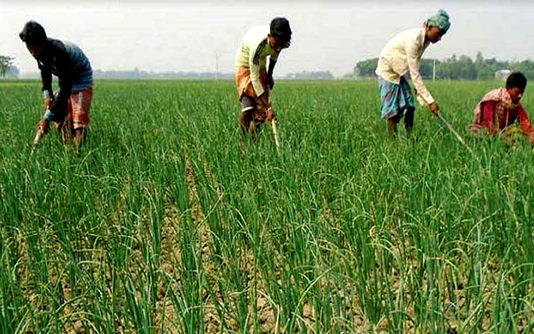By Dr Aynal Haque
RAJSHAHI, Dec 2, 2020 (BSS) – Around 13.53 lakh tonnes of spicy crops are
expected to be yielded from 1.52 lakh hectares of land in all eight districts
under Rajshahi division during the current Rabi season.
Department of Agriculture Extension (DAE) has set the target of producing
5.85 lakh tonnes of crops from 64,615 hectares of land in four districts
under Rajshahi Agricultural Zone, while 7.68 lakh tonnes from 86,172 hectares
of land in four other districts in Bogura Agricultural Zone.
The DAE has also set the target of producing 9.33 lakh tonnes of onion
from 88,800 hectares of land, 3.89 lakh tonnes of garlic from 46,117
hectares, 26,701 tonnes of chili from 13,150 hectares, 3,563 tonnes of
coriander from 2,548 hectares and 1,172 tonnes of black cumin from 1,172
hectares of land.
Various agricultural extension and research organizations have taken all
possible measures to attain the target as demand of the spicy crops are
gradually mounting with the rising population.
Rajshahi Krishi Unnayan Bank (RAKUB) has, so far, disbursed Taka 211 crore
loans among 25,047 farmers for spicy crop farming at four percent interest in
the country’s northwest region, said Muhammad Idrish, Deputy Managing
Director of RAKUB.
Presently, the local kitchen markets and other growth centres have become
plentiful with the newly harvested chilli and other winter vegetables.
Farmers are also happy after getting both good yield and market price of
the summer chili everywhere in the region. Around 27,000 farmers were given
seeds and fertilizers free of cost for chili farming, while 14,000 farmers
for onion farming in the division under the current Rabi season’s
agricultural incentive programme, said Sirajul Islam, Additional Director of
DAE.
Farmers have cultivated the advanced variety of onion on around 6,560
hectares of land in the Barind area alone this season and most of them are
very much hopeful about getting a lucrative price of the upcoming harvest of
the cash crop.
Meanwhile, farming of onion may break all the previous records in the
region including its vast Barind tract as farmers are seen humming towards
the spicy crop in the wake of its unusual price hike.
Everywhere in the region, farmers are now seen very much busy in nursing
the growing onion plants and preparing their lands of transplanting onion
seedlings creating scopes of seasonal employment for many people.
Sazammul Haque, a farmer of Darusha village under Paba Upazila, said he
had sold onion seedlings at Taka 1,400 to 1,500 per mound in the previous
years due to manifold interests of the farmers.
Kamrul Islam, another farmer of Duary village, said he has cultivated
onion seed on five bighas of land at a cost of around Taka three lakh and
hoping of making profit due to rising of its price. Anwar Hossain of Bidirpur
village under Godagari Upazila, said he’s cultivating onions this year for
the first time. He bought seedlings at a cost of Taka 2,200 per mound.
He said there is a bright prospect of bringing more acreage under onion
farming in the Barind region as the farmers are very much interested to
cultivate the crop for its feature to consume less water.
Shamsul Haque, Deputy Director of DAE, said there is a prospect of massive
onion farming this time adding that farming can be spread onto more land this
year than that of the previous one.
In nature, farmers of the region are habituated to farming of various
vegetables including the spicy crops. The unusual price hike of onion has
enhanced their interests to a greater extent this year, he added. Prof
Chowdhury Sarwar Jahan of Department of Geology and Mining in Rajshahi
University said promotion of less-water consuming crops in the Barind area is
a good sign for lessening the gradually mounting pressure on its underground
water.
More than 1,400 volunteers are motivating farmers to cultivate less water
consuming crops through water resource management on behalf of the
‘Integrated Water Resource Management (IWRM)’ Project.
DASCOH Foundation has been implementing the IWRM project in 1,280 drought-
hit villages of 39 Union Parishad and three municipalities in eight upazilas
of Rajshahi, Naogaon and Chapainawabganj districts with financial support of
Swiss Agency for Development and Cooperation since 2015.



